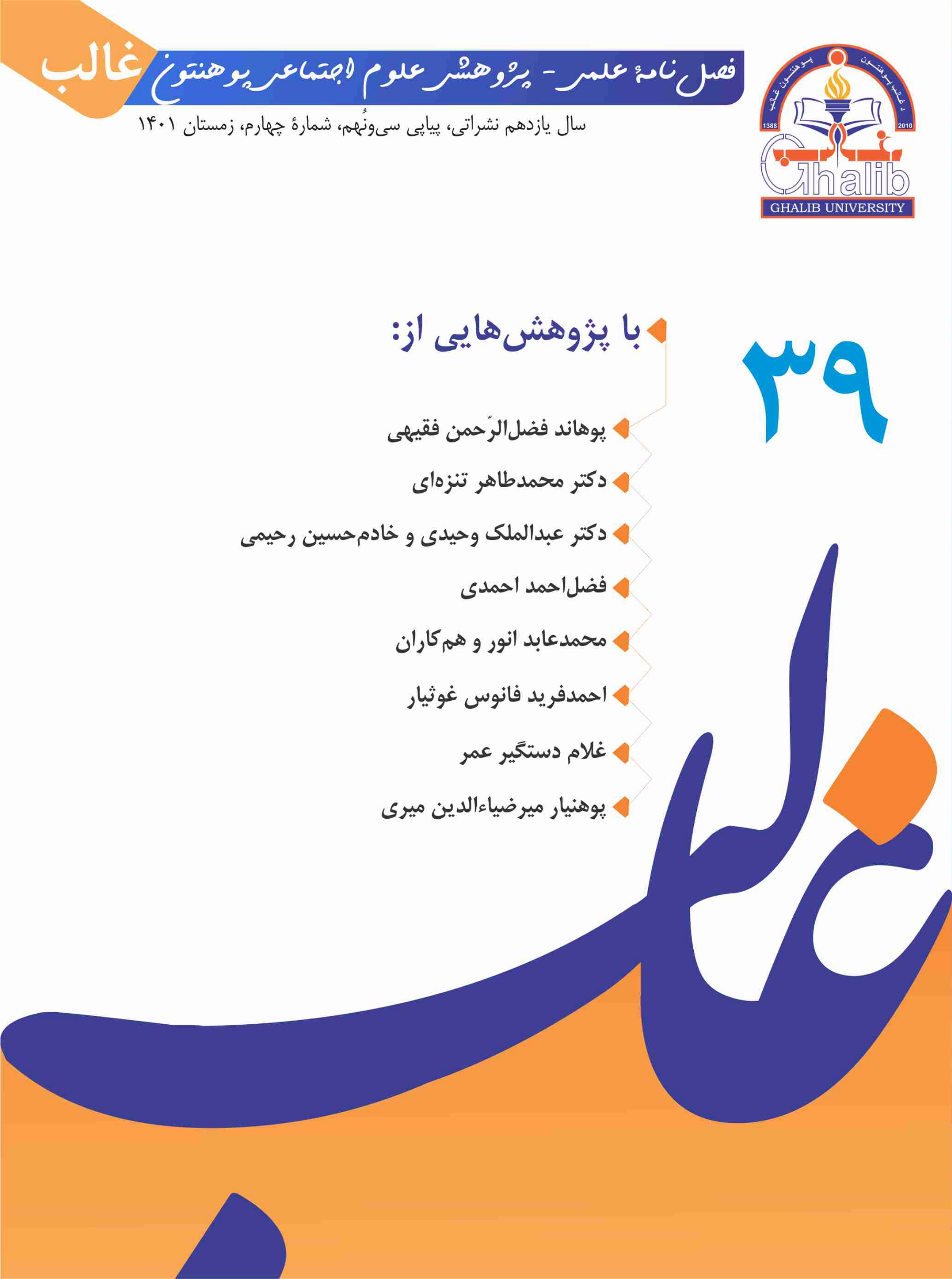Imam Abu Hanifah (RA) and the struggle against political tyranny
DOI:
https://doi.org/10.58342/ghalibqj.V39.I4.6Keywords:
Imam Abu Hanifah, political tyranny, struggle, Umayyads, AbbasidsAbstract
The fame of Imam Abu Hanifah as the standard bearer of Islamic jurisprudence and theology is not hidden from anyone. Who lived in the time of the great governments and empires of the Islamic world, that is, the Umayyad’s and the Abbasids, struggle against the ruling political tyranny in practice and theory. His public struggle and support for the oppressed caused him to be forcibly brought to the court many times and the rulers communicated their orders to him; But he still did not submit to any kind of tyranny, and finally, because of refusing the orders, which he considered to be against Sharia, he was imprisoned and died. The Imam's basic approach to the arbitrariness and arbitrariness of the rulers was a peaceful struggle and that too by challenging their actions from a jurisprudential point of view, a practice that was not limited to the time of the Imam's life, but which spread more every day than yesterday, and finally the Ahnaf are still in conflict with political tyranny. This issue becomes important when the rightness of the Imam's struggles against the tyranny of the time can be clearly proven. This research, which investigated this matter, sought to find an answer to this question: What was Imam Abu Hanifah's opinion and perspective on political tyranny and in what ways did he struggled against it? Using the descriptive-historic method and with the help of library sources, the conclusion was reached that Imam Abu Hanifah struggled against political tyranny in both governments of his time (Umayyads and Abbasids) and supported the oppressed against the coercion and force of the rulers and rulers. has done; As he himself has become a victim of the struggle against tyranny.
References
قرآن کریم.
ابو زهره، امام محمد. (1947). ابوحنیفه حیاته، عصره، آرائه و فقه. ناشر. دارالفکر العربی. نسخۀ الکترونیکی. قابل دسترس: <https://waqfeya.net/book.php?bid=1327>.
ابوزهره، امام محمد. (1430). تاریخ مذاهب الاسلامی. القاهره: ناشر.دارالفکر العربی. الطبع؟
الاصفهانی، ابی الفرج. (بیتا). مقاتل الطالبیین. شرح و تحقیق: السید احمد صقر. کجا: منشورات الشریف الرضی.
اصلاح، پایگاه اطلاع رسانی. (1394). «کارنامه امام ابوحنیفه». .
الأفغانی، مولوی محمد ملاعبدالله. (1399). عقود الجمان فی مناقب الامام الاعظم ابی حنیفه النعمان. رساله لنیل درجه الماجستیر. جامعه الملک عبدالعزیز. اشراف احمد فهمی ابوسنه. المملکه العربیه السعودیه.
بغدادی، الامام ابو بکر احمد بن علی بن ثابت الخطیب. (2004). تاریخ البغداد. ضبط و تحقیق صدقی جمیل العطار. الجزء الحادی عشر. الطبع الاولی. بیروت- لبنان: دارالفکر.
بغدادی، الامام ابوبکر احمد بن علی بن ثابت الخطیب. (2001). تاریخ مدینه السلام (تاریخ بغداد). الجزء الخامس عشر. حققه. ضبط نصه و علق علیه. بشار عواد معروفم. بیروت – لبنان: دارالغرب الاسلامی.
التمیمی، عبدالنبی. (بیتا). الخلاف بین المنصور و أبی حنیفه فی مسئله القضاء. قسم التاریخ. کلیه الآداب. عراق: جامعه الکوفه.
جرجاوی، علی احمد. (1388). حکمت و فلسفه شریعت. مترجم: عبدالواحد احراری. تربتجام: انتشارت شیخالاسلام.
خضر بک، شیخ محمد. (1392). تاریخ حقوق اسلامی. مترجم: سیدهاشم موسوی آبگرم. تهران: نشر احسان.
الدسوقی، محمد. (1978). الامام محمدبن الحسن الشیبانی و اثره فی الفقه الاسلامی. الدوحه- القصر: دارالثقافه.
دلیر وکریمی قهی، نبیره و منصوره. (1394). «رفتارهای سیاسی علمای شاخص اهل سنت و امامیه با خلافت عباسی». فصلنامة علمی- ترویجی مطالعات تقریبی مذاهب اسلامی (فروغ وحدت) سال یازدهم. دورة جدید. شمارة 42. صص 35- 48. قابل دسترس: <http://ensani.ir/fa/article/359488/>.
الذهبی، الامام الحافظ شمس الدین محمد بن احمد بن عثمان. (1408). مناقب الإمام ابی حنیفه و صاحبه ابی یوسف و محمد بن الحسن. الطبعه الثالثه. بیروت- لبنان، بحیدر آباد الدکن بالهند: لجنه إحیاء المعارف النعمانیه.
الذهبی، الامام الحافظ شمسالدین محمد بن احمد بن عثمان. (1996). سیر اعلام النبلاء. الطبعه الحادی عشره. بیروت: مؤسسه الرساله.
الشکعه، مصطفی. (1983). الامام الاعظم ابوحنیفه النعمان. بیروت: دارالکتب اللبنانی.
شیبه الحمد، عبدالقادر. (1433). الادیان والفرق و المذاهب المعاصر. الطبعه الرابعه. الریاض- المملکه العربیه السعودیه: مکتبه فهد الوطنیه.
الصیمری، القاضی ابی عبدالله حسین بن علی. (1985). اخبار ابی حنیفه و اصحابه. الطبعه الثانیه. بیروت- دمشق: عالم الکتب.
غاوجی، وهبی سلیمان. (1993). ابوحنیفه النعمان (امام الائمه الفقهاء). الطبعه الخامسه. دمشق-بیروت: الناشر دارالقلم.
الغزی، تقیالدین. (1403). «الطبقات السنیه فی تراجم الحنفیه». .
قرضاوی، یوسف. (1396). فقه سیاسی. مترجم: عبدالعزیز سلیمی. چ دوم. تهران: نشر احسان.
الکُمِلّائی، محمد حفظ الرحمن. (2007). مکانه ابی حنیفه فی الفقه و الحدیث. الطبعه الثانیه. داکا: مکتبه شیخالاسلام.
المودودی، ابو الاعلی. (1978). الخلافه الملک. الکویت: دارالقلم.
نجّار، اسعد. (1934). «امام ابوحنیفه در هالة دشمنان و هواداران متعصب». مترجم: مهران موحد. ناشر: روزنامة ماندگار. سال هشتم. شمارۀ 1934. چهارشنبه، 8 جدی 1395. قابل دسترس در: <https://mandegardaily.com/?p=53912>.
الوادعی، ابی عبدالرحمن مقبل بن هادی. (بیتا). نشر الصحیفه فی ذکر الصحیح من اقوال أئمه الجرح و التعدیل فی ابی حنیفه. القاهره: دارالرحمن.
الهیتمی، الشیخ شهاب الدین احمد بن حجر. (بیتا). الخیرات الحسان فی مناقب الامام الاعظم أبی حنیفه النعمان. طبع علی تفقه مولوی محمد عبدالله جیتیکر و شرکائه فی بومی الهند سنه1324 (طبع بمطبعه السعاده بجوار محافظه مصر).
Downloads
Published
How to Cite
Issue
Section
License
Copyright (c) 2022 Ghalib Research and Scientific Quarterly Journal

This work is licensed under a Creative Commons Attribution-NonCommercial-NoDerivatives 4.0 International License.













